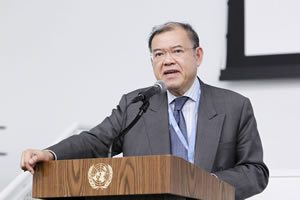In repose to Resolution A/GA/66/189 of the General Assembly, the UNCTAD Secretariat took the lead to organize a special event on Sovereign Debt Crises and Restructurings: Lessons Learnt and Proposals for Debt Resolution Mechanisms.
The Special event, which took place on Thursday, 25 October 2012 at the United Nations Headquarters in New York, attracted more than 300 participants, with delegates from over 150 nations.
The event was opened by the President of the General Assembly H.E. Mr. Vuk Jeremic, and by UNCTAD's Secretary-General, Mr. Supachai Panitchpakdi, who gave a substantive introduction. Professor Kenneth Rogoff of Harvard University delivered the keynote speech.
 UNCTAD Secretary-General Mr. Supachai Panitchpakdi |
The interactive debate, which included presentations of lessons learnt from past debt crises and whether there were missing links in the international financial architecture for debt restructuring, was led by H.E. Mr. Arvinn Eikeland Gadgil (State Secretary for International Development, Norway), H.E. Ms. Maria Kiwanuka (Minister of Finance, Planning and Economic Development, Uganda), H.E. Mr. Adrián Cosentino (Secretary of Finance, Argentina), Mr. Otaviano Canuto, (Vice-President, PREM, the World Bank), Ms. Shamshad Akhtar (Assistant Secretary-General, DESA, United Nations), and Mr. Martin Khor, (Executive Director, South Centre)
In his opening remarks, the President of the General Assembly noted that this is the first time that the General Assembly discusses the need for creating a sovereign debt restructuring mechanism and recognized UNCTAD's long standing work on this subject. Dr. Supachai highlighted the problems of the current non-system and the reason why UNCTAD is committed to working with the alternatives.
In his keynote speech, Professor Rogoff emphasized that times are ripe for the creation of a structured mechanism for resolving sovereign debt crises. In recognizing UNCTAD's pioneering work, which dates back to the mid-1980s, Professor Rogoff also suggested that the United Nations are the ideal organization for coordinating such a mechanism, and pointed out that institutions that engage in lending could not be honest brokers in adjudicating sovereign claims.
H.E. Mr. Arvinn Eikeland Gadgil of Norway reiterated the importance of having a structured mechanism. He also related the discussion on debt restructuring with UNCTAD's work toward developing a set of Principles on Responsible Sovereign Lending and Borrowing, which, in his view, have been a "small revolution" in sovereign debt. In this context, the Government of Norway announced that it will continue to financially support UNCTAD's work on the Principles and on the design of a debt sovereign restructuring mechanism. During the meeting, the Representative of the Government of Mauritania officially endorsed the Principles.
The need for a mechanism for dealing with sovereign insolvency was also emphasized by H.E. Mr. Adrián Cosentino of Argentina who suggested that sovereign insolvency still operates in a legal vacuum. H.E. Ms. Maria Kiwanuka of Uganda also supported a more structured mechanism for dealing with debt crises, but emphasized the importantce of prudent policies to avoid getting into a debt crisis.
The opening speeches were followed by a lively discussion with delegates from member states, international financial institutions and civil society. While there was no agreement on the desirability of a structured mechanism for the resolution of sovereign debt crises, participants agreed that this topic should be at the center of the debate on the reform of the international financial architecture. Many participants also agreed that the United Nations are the ideal forum for this discussion, and recognized and appreciated UNCTAD's leading role in this debate.
While noting that earlier work on the creation of a sovereign debt restructuring mechanism focused on creditor coordination, a problem that can be partly solved with the introduction of collective action clauses, participants recognized that problems of fairness, seniority, interim financing, and delayed restructuring are more important than creditor coordination.
The Special event was followed by a technical stakeholders' meeting during which experts discussed the pros and cons of different institutional set ups of a possible debt restructuring mechanism. The UNCTAD Expert Group on Responsible Sovereign Lending and Borrowing also held a meeting to discuss the Guidelines on Implementation of the aforementioned Principles.


